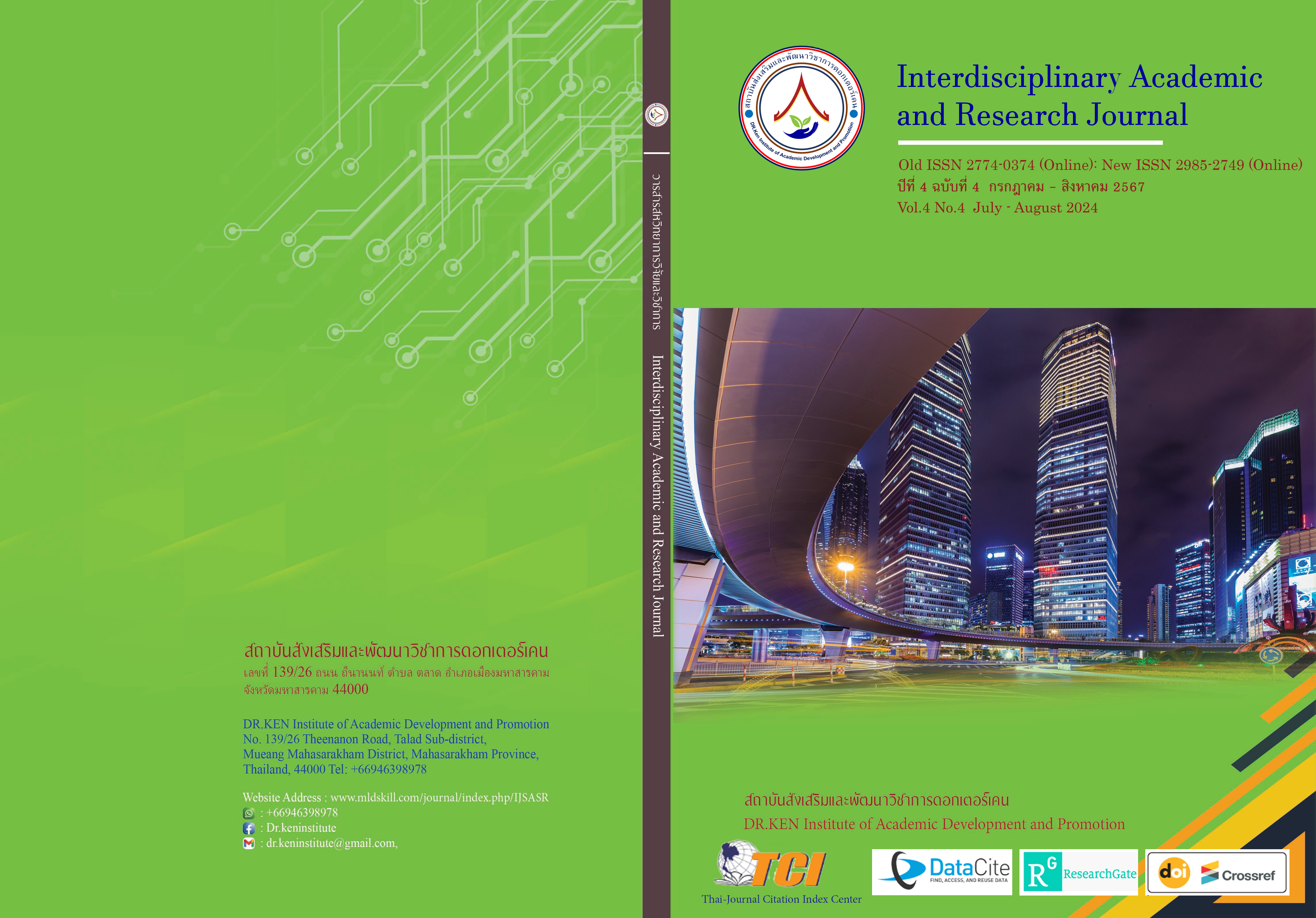Effect of a REAP Strategy on the Analytical Reading Abilities of Third-Year Secondary School Students
DOI:
https://doi.org/10.60027/iarj.2024.276607Keywords:
REAP strategy, , Analytical Reading Abilities, , Third-Year Secondary School StudentsAbstract
Background and Aims: Analytical reading skills are crucial for secondary school students to critically evaluate information and make reasoned decisions. However, the results of the 2022 PISA assessment found a declining trend in Thai students' reading skills. Additionally, an assessment of reading, analysis, and writing skills at Viwattavidya School (pseudonym) revealed that students' average scores were below the set standards. This was attributed to students lacking the ability to analyze content from reading passages and being unable to write their own summaries. Furthermore, teachers may also lack the knowledge to effectively teach reading skills. Therefore, researchers aim to enhance third-year secondary school students' analytical reading abilities through REAP learning activities. This research aims to evaluate the impact of using the REAP method on students' analytical reading abilities by comparing the median scores of students' analytical reading abilities before and after the experiment.
Methodology: The target population in the research was 31 students who studied at the Third-Year secondary school level in the second academic year 2023 at Wiwatwittaya (pseudonym), Bangkok, Thailand. The students were selected to participate in the research using a purposive sampling method. The research instrument for collecting data was an analytical reading abilities test. The test was a multiple-choice test. The instruments for the experiment were 6 lesson plans designed following the REAP strategy. Quantitative data resulting from the test were examined to check the median score and standard deviation. Additionally, the findings were analyzed to check statistical significance by using the Wilcoxon test.
Results: The results showed that the median score of analytical reading abilities was higher than before the experiment at the 0.05 level of significance.
Conclusion: The REAP method can enhance the analytical reading abilities of Third-Year high school students by helping readers organize their thoughts while reading and engaging with the text systematically. Additionally, readers develop writing skills alongside reading, and there is continuous discussion and exchange of ideas. Consequently, students' analytical reading abilities improve progressively.
References
กระทรวงศึกษาธิการ. (2551). หลักสูตรแกนกลางการศึกษาขั้นพื้นฐานพุทธศักราช 2551. โรงพิมพ์ชุมนุมสหกรณ์การเกษตร.
การุณันทน์ รัตนแสนวงษ์. (2555). การอ่านและการเขียนเชิงวิชาการ. ห้างหุ้นส่วนจํากัด แสงจันทร์การพิมพ์.
จิรวัฒน์ เพชรรัตน์, และอัมพร ทองใบ. (2556). การอ่านเพื่อพัฒนาคุณภาพชีวิต. กรุงเทพฯ: โอเดียนสโตร์.
ชนาธิป พรกุล. (2555). การออกแบบการสอน การบูรณาการการอ่าน การคิดวิเคราะห์ และการ เขียน. สํานักพิมพ์แห่งจุฬาลงกรณ์มหาวิทยาลัย.
ชัยวัฒน์ สุทธิรัตน์. (2557). เทคนิคการใช้คำถามพัฒนาการคิด. พิมพ์ครั้งที่ 4. กรุงเทพ : วีพรินต์ (1991) จำกัด.
ณัฐพร สายกฤษณะ. (2563). การพัฒนาความสามารถในการอ่านวิเคราะห์และการเขียนสรุปความของนักเรียนชั้นมัธยมศึกษาปีที่ 2 โดยการจัดกิจกรรมการเรียนรู้ตามกลวิธี REAP ร่วมกับเทคนิคการใช้ผังกราฟิก. วิทยานิพนธ์ปริญญามหาบัณฑิต : มหาวิทยาลัยศิลปากร.
วีรภัทร ศุภรสิงห์. (2562). ผลของการจัดการเรียนรู้โดยใช้กลวิธี REAP ที่มีต่อผลสัมฤทธิ์ทางการเรียนวรรณคดีไทยและความสามารถในการคิดเชิงวิพากษ์ของนักเรียนชั้นมัธยมศึกษาปีที่ 5. วิทยานิพนธ์ปริญญามหาบัณฑิต :มหาวิทยาลัยศรีนครนิทรวิโรฒ.
สถาบันภาษาไทย สํานักวิชาการและมาตรฐานการศึกษา. (2560). การพัฒนาทักษะการอ่าน คิด วิเคราะห์ และเขียนสื่อความ. โรงพิมพ์สํานักงานพระพุทธศาสนาแห่งชาติ.
สํานักงานคณะกรรมการพัฒนาการเศรษฐกิจและสังคมแห่งชาติ. (2560). แผนพัฒนาเศรษฐกิจและสังคมแห่งชาติ ฉบับที่ 12 (พ.ศ.2560-2564). กรุงเทพฯ: สํานักงานคณะกรรมการพัฒนาการเศรษฐกิจและสังคมแห่งชาติ.
อรจิรา อัจฉริยไพบูลย์. (2560). อรจิราวิชาการ : ศิลปะการอ่านวิจารณ์วรรณกรรม. สํานักพิมพ์มหาวิทยาลัยนเรศวร.
Adler, M.J., & Doren, C.V. (1972). How to read a book. New York: Touchstone.
Albee, J.A.J. (2000). The effect of Read-Encode-Annotate-Ponder Annotation Exchange (REAP AnX) on the complex thinking skills of undergraduate students in children's literature courses. Unpublished doctoral dissertation: University of Missouri-Kansas City.
BBC News ไทย. (2023). ไม่เข้าใจบทเรียน - ครูไม่พอ - เด็กอดอยาก : อ่านรายงานผล PISA นักเรียนไทย. Retrieved on 10 April 2023 from: https://www.bbc.com/thai/articles/cnlp7p5qjwyo
Bloom, B.S. (1956). Taxonomy of Educational Objectives, Handbook: The Cognitive Domain. New York: David McKay.
Boyles, N. (2013). Closing in on Close Reading. Educational Leadership, 70(4), 36-41.
https://api.semanticscholar.org/CorpusID:143325342
Cohen et al., (2018). Research Methods in Education. 8th edition. Routledge.
Eanet, M.G., & Manzo, A.V. (1976). REAP - A Strategy for Improving Reading/Writing/Study Skills. Journal of Reading, 19(8), 647–652. http://www.jstor.org/stable/40032892
Manzo, A., Manzo, U., & Albee, J.J. (2002). iREAP: Improving Reading, Writing, and Thinking in the Wired Classroom. Journal of Adolescent & Adult Literacy, 46(1), 42–47. http://www.jstor.org/stable/40017504
Miller, H.W. (1990). Reading comprehension activities kit: ready-to-use techniques and worksheets for assessment and instruction. New York: West Nyack.
Risdianto, F. (2023). REAP Method. Retrieved April 14, 2023, from: https://www.pakfaizal.com/2023/08/reap-method.html
Salkind, N.J., (2017). Statistics for people who (think about) hate Statistics. 6th edition. SAGE.
Downloads
Published
How to Cite
Issue
Section
License
Copyright (c) 2024 Interdisciplinary Academic and Research Journal

This work is licensed under a Creative Commons Attribution-NonCommercial-NoDerivatives 4.0 International License.
Copyright on any article in the Interdisciplinary Academic and Research Journal is retained by the author(s) under the under the Creative Commons Attribution-NonCommercial-NoDerivatives 4.0 International License. Permission to use text, content, images, etc. of publication. Any user to read, download, copy, distribute, print, search, or link to the full texts of articles, crawl them for indexing, pass them as data to software, or use them for any other lawful purpose. But do not use it for commercial use or with the intent to benefit any business.
















.png)


